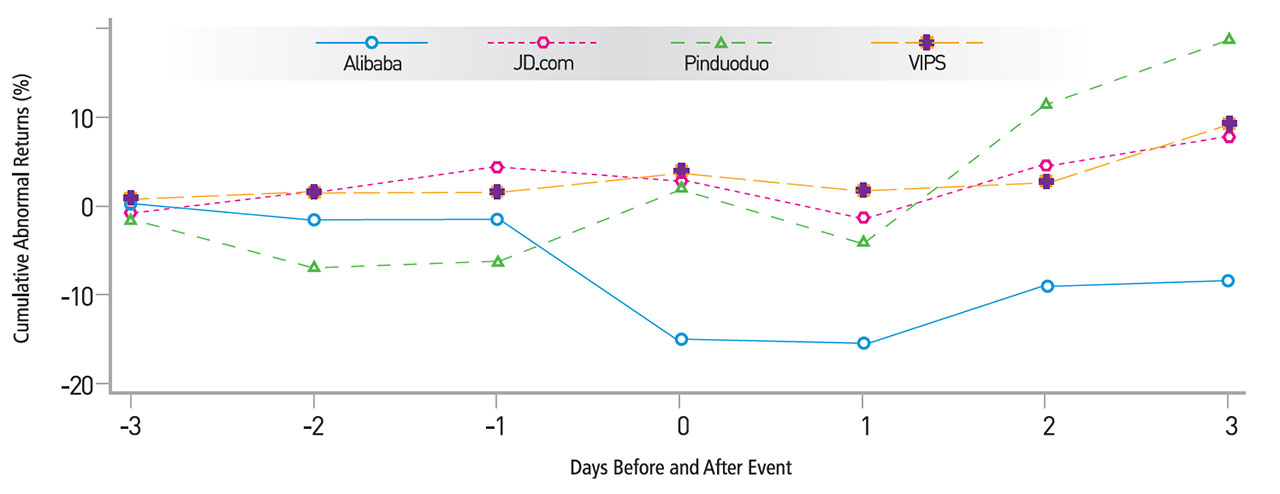The Chinese internet industry has witnessed rapid growth under laissez-faire regulation for over two decades during which time a few internet companies have grown into global giants. Alibaba has been the market leader of the e-commerce sector thanks to the success of its e-commerce platforms Taobao and Tmall, along with its popular payment solution Alipay, logistic network Cainiao, and financial wing Ant Finance. In 2020, goods valued at $1.2 trillion were sold globally on Alibaba's platform, higher than Amazon's $575 billion record. Tencent, originally a leading social network internet company with featured products such as WeChat, QQ, and Q-Zone (sometimes referred to as China's Facebook) has expanded into gaming, digital payments, music, and video streaming.
JD.com and Pinduoduo are market followers in the e-commerce sector in China but have quickly evolved into strong players. Meituan initially mimicked the business model of Groupon but eventually became a market leader in food delivery and reservations, comparable to a conglomerate of Grubhub, OpenTable, and Uber Eats. The combined stock market value of the top five Chinese internet firms (i.e., Alibaba, Tencent, JD.com, Pinduoduo, and Meituan) reached $1.87 trillion in 2021, approximately 10.5% of China's GDP. Although these platforms have grown into giants, major antitrust enforcement cases were not made on them until 2021.
From laissez-faire to regulation
On February 7, 2021, the State Administration for Market Regulation (SAMR), China's antitrust authority, officially released the Antitrust Guidelines for Platform Economy (the "Platform Antitrust Guidelines"), which was a milestone in the gradual transition of China's antitrust enforcement from a laissez-faire mode to a strong regulation mode. Along with the legislation, SAMR launched two investigations against Alibaba and Meituan-for their "either-or" exclusive dealing policy with merchants, on December 24, 2020 and April 26, 2021, respectively. These two investigations result in SAMR imposing a fine of $2.79 billion on Alibaba, equivalent to 4% of Alibaba's total domestic sales in 2019, and a fine of $0.53 billion on Meituan, equivalent to 3% of Meituan's domestic sales revenue in 2020.
In the meantime, a series of legislation was imposed against internet platforms in China, including the Data Security Law, Provisions on Prohibited Acts of Unfair Online Competition (draft), and so on. Consequently, the stock prices of internet platforms plummeted, with the Nasdaq China US Internet Tiger Index's (QNETCN) value dropping by 52.2% from February 17, 2021 to March 15, 2022.
Curbing the disorderly expansion of capital
The ever-increasing regulatory scrutiny has evoked concerns from investors and industry participants. It has also dampened their incentive to invest, which further dimmed the prospects of the internet platform economy. As emerging economic entities, internet platforms have been a major driving force of the market economy. However, with the Chinese government's determination to prevent the capital from expanding in a disorderly fashion (later on termed as "to curb the disorderly expansion of capital"), internet platforms have become one of the major targets for government regulation. (Zhang, 2021, 2022). This series of regulatory actions has raised intense debate regarding the impact of current regulatory policies on the industry and stock markets. To shed light on the debate, we examine the impact of antitrust regulations on firm market value for Chinese internet platforms in comparison with their US counterparts. Specifically, we conducted an event study analysis using historical stock market data of the Chinese and US internet platforms listed on the US and Hong
Kong stock exchanges.
The results of antitrust investigation
We have five main findings. First, we find that the start of antitrust investigations of Chinese internet platforms has led to a significant decrease in the target firms' market values.
Alibaba's stock price dropped about 15% relative to market index. The seven-day abnormal change of Alibaba's stock price is -8.5%. Second, the start of antitrust investigations boosted target firms' competitors' stock prices. For example, the rivals of Alibaba, JD.com, Pinduoduo, and VIPS experience a seven-day abnormal change of stock price of -12%. The findings suggest that antitrust regulations curb anticompetitive behaviour and foster a healthier environment for competition, thereby increasing competitors' market values.
The figure below shows the stock price changes of Alibaba, JD.com, Pinduoduo, and VIPS around the antitrust investigation of Alibaba on December 24,
2020. The figure shows that the stock prices of Alibaba dropped significantly in response to the investigation while the stock prices it rivals increased.
The impact of the launch of the Alibaba investigation
Third, we show that the end of antitrust investigations in China resulted in a stock price surge for the investigated company, presumably because of the resolution of market uncertainties, while the stock prices of other leading platforms with similar anticompetitive conduct decreased.
Fourth, applying the same analysis to the EU/US antitrust regulations against US internet platforms, we find that the effects were minor. This difference in results may be explained by the differences in institutional background.
In the European Union and the United States, the implemented administrative enforcement mechanisms and judicial remedies take a longer time, and the final outcomes are more uncertain than in China. Therefore, the start of the investigations in the European Union and the United States had negligible effects on the market values of the US platforms. Only when the outcomes were disclosed at the end of the investigations did the US platforms suffer from a negative drop in market prices.
Finally, we examine the impact of antitrust legislation on the firm value of Chinese and US internet platforms.
We find that stock markets react more strongly to the cases of Chinese companies than their US counterparts.
This finding may reflect investors' belief in the Chinese antitrust authority's stronger discretion in antitrust enforcement.
Our work is novel in three aspects. First, to the best of our knowledge, this is the first work to estimate the impact of Chinese antitrust regulations on the market value of Chinese internet platforms. Second, we compare the impact of Chinese and EU/US antitrust regulations on the market value of Chinese and US internet platforms and document the contrasting findings, thereby highlighting jurisdictional heterogeneity in the antitrust domain. Finally, we examine the impact of Chinese antitrust regulations on competitors and document the different findings from those in existing literature.
Reference:
https://papers.ssrn.com/sol3/papers.cfm?abstract_id=4393573


